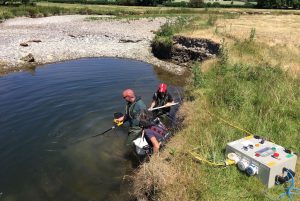Informing the power sector
“There is much to be done and having access to the existing About Drought materials can only better inform the deliberations.”
Neil Edwards, Environment & Chemistry Technical Support, RWE Generation UK
Neil Edwards has represented RWE Generation UK in stakeholder discussions with MaRIUS and DRY, as well as attending conferences and workshops. He believes those connections have enabled About Drought’s outputs to be of greater benefit to the power sector, including building better resilience of services that rely on water-dependent infrastructure.
He says: “The next few years could be important in how the UK positions itself to deliver resilience of services – such as public water supply, power and food – in a period in which we are going to be economically and institutionally challenged. There is much to be done and having access to the existing About Drought materials can only better inform the deliberations.
New contacts improved understanding
“I’ve developed useful contacts through networking at the major events and workshops with practitioners that I didn’t have before. The networking and events together, gave me opportunities to contribute to improving the wider understanding of the interaction between power plants and the aquatic environment, which is sometimes not well-represented in academic literature.
Boost for power sector
“I believe this to be of value to RWE and to the wider power sector. It led to some power sector-focused work being done within the research programme, which has given power sector players a better information base to think through some aspects of water quality in drought and hence, contribute to developing better understanding of resilience issues.
“I also hope that the forecasting initiative with CEH will lead to improved river flow and seasonal weather forecasting information for relevant power sector locations, which will aid better risk management of commercial positions in low flow events; though this has not advanced as fast as I would have liked.”
Neil has also been able to draw on access to communications resources. He says: “I have used the softer communications / story telling materials to get an understanding of wider social considerations surrounding major drought events as background in participation in freshwater-related stakeholder activity, such as interaction with DEFRA/EA on water resource management and regional water planning.”
Risk and scenario building
Collaboration with MaRIUS supported RWE’s work on risk to power generation and scenario building. Neil says: “We have used the tailored water quality modelling work to better understand potential risk – this is now factored into our thinking and into our interaction with DEFRA/EA on aspects of resilience. We are aware of the grid-to-grid river flow work and climate change-related work, and we would access it if we felt the need.”
Interview by Sally Stevens
Posted October 2019

